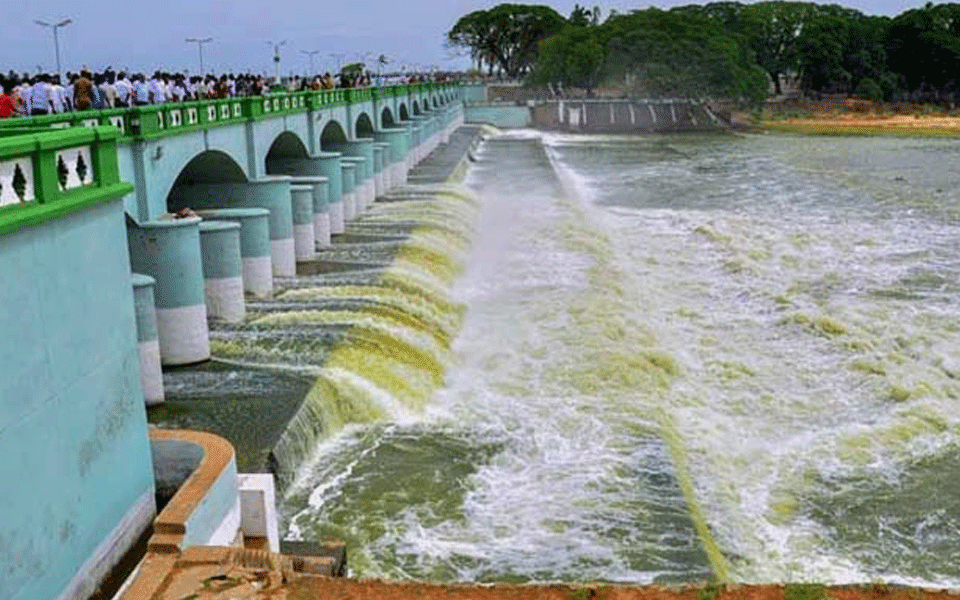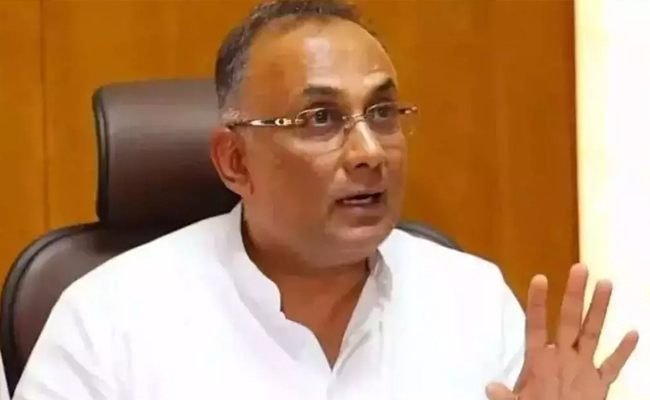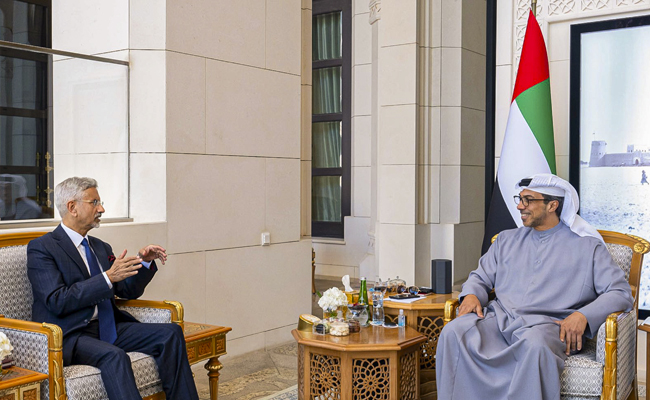New Delhi, June 1: The Centre on Friday notified the Cauvery Water Management Authority (CWMA) for implementation of the Cauvery Water Tribunal Award on sharing of waters between Tamil Nadu, Karanataka, Kerala and Puducherry.
The action comes less than a fortnight after the Supreme Court gave its nod for CWMA for the implementation of the 2007 Cauvery Tribunal Award after the government placed the scheme following the completion of Karnataka assembly elections. It had earlier taken the stand that it was not in a position to formulate the scheme in view of the sensitivity of the state elections.
CWMA will consist of a Chairman, two whole-time members, two part-time members and four part-time members from states concerned and its decisions for implementing the Tribunal award, as modified by the Supreme Court, shall be final and binding on all states, the notification said.
Water Resources Secretary U.P. Singh had told IANS earlier that the ministry's notification for setting up CWMA and Cauvery Water Regulation Committee (CWRC) will come out on Friday.
On May 18, a bench of the Supreme Court had observed that the draft scheme was in consonance with the dictum and directions in the Award, as modified by the court and also in conformity with Section 6A of the 1956 Act.
It asked the Centre to take the scheme forward to its logical end in accordance with law with utmost dispatch and notify it before the monsoon season sets in on June 1.
Replying to a question, the Water Resources Secretary said what was being notified was what the Supreme Court had accepted and the Court, in its judgement, has brought out the entire scheme actually
Asked about further steps, Singh said the ministry will be writing to the states concerned to nominate their representatives on the authority and the Cauvery Water Regulation Committee.
"I have also requested Secretary, Ministry of Agriculture to nominate their officer and there are a few officers to be nominated by our ministry. As soon as we get the nomination from states and Agriculture Ministry, then we will constitute the authority and the committee," he said.
He said the authority will take shape in a few days time.
Under the draft scheme presented to the court, the authority, which will be headquartered in Delhi, would the be sole body to implement the Cauvery Water Disputes Tribunal award on distributing the river waters between the states, as modified by the apex court. The Centre would have no say in it except for issuing administrative advisories to it.
The CWMA will be assisted in the discharge of its functions by CWRC located in Bengaluru, mandated to collect daily water levels, inflows and storage position at Hemavathy, Harangi, Krishnarajasagara, Kabini, Mettur, Bhavanisagar, Amaravathy and Banasurasagar reservoirs.
Clearing the draft scheme, the court rejected the suggestion/objections to the scheme by Karnataka and Kerala.
It had said that the CWMA will be bound by the contours regarding apportionment of river water in terms of the Award.
While doing so, the authority is "expected to take into account all factors that may be relevant at the given point of time, including to identify the situation of distress in the basin caused due to identifiable factors before quantifying the water quantity for being released or allotted to the party States/UT for the relevant period".
The authority is vested with the power and duty to "do any or all things necessary, sufficient and expedient for securing compliance and implementation of the final decision and directions of the tribunal further modified by Supreme Court order" of February 16.
The CWMA has been vested with the powers to supervise the storage, apportionment, regulation and control of Cauvery waters; supervision of operation of reservoirs and with regulation of water releases with the assistance of Regulation Committee; and regulated release by Karnataka at the inter-state contact point at Billigundulu gauge and discharge station, located on the Karnataka-Tamil Nadu border
The CWRC will have five members apart from the Chairman and the member-secretary, with the whole-time members including a member (water resources) and a member (agriculture).
Let the Truth be known. If you read VB and like VB, please be a VB Supporter and Help us deliver the Truth to one and all.
New Delhi: A bill to set up a 13-member body to regulate institutions of higher education was introduced in the Lok Sabha on Monday.
Union Education Minister Dharmendra Pradhan introduced the Viksit Bharat Shiksha Adhishthan Bill, which seeks to establish an overarching higher education commission along with three councils for regulation, accreditation, and ensuring academic standards for universities and higher education institutions in India.
Meanwhile, the move drew strong opposition, with members warning that it could weaken institutional autonomy and result in excessive centralisation of higher education in India.
The Viksit Bharat Shiksha Adhishthan Bill, 2025, earlier known as the Higher Education Council of India (HECI) Bill, has been introduced in line with the National Education Policy (NEP) 2020.
The proposed legislation seeks to merge three existing regulatory bodies, the University Grants Commission (UGC), the All India Council for Technical Education (AICTE), and the National Council for Teacher Education (NCTE), into a single unified body called the Viksit Bharat Shiksha Adhishthan.
At present, the UGC regulates non-technical higher education institutions, the AICTE oversees technical education, and the NCTE governs teacher education in India.
Under the proposed framework, the new commission will function through three separate councils responsible for regulation, accreditation, and the maintenance of academic standards across universities and higher education institutions in the country.
According to the Bill, the present challenges faced by higher educational institutions due to the multiplicity of regulators having non-harmonised regulatory approval protocols will be done away with.
The higher education commission, which will be headed by a chairperson appointed by the President of India, will cover all central universities and colleges under it, institutes of national importance functioning under the administrative purview of the Ministry of Education, including IITs, NITs, IISc, IISERs, IIMs, and IIITs.
At present, IITs and IIMs are not regulated by the University Grants Commission (UGC).
Government to refer bill to JPC; Oppn slams it
The government has expressed its willingness to refer it to a joint committee after several members of the Lok Sabha expressed strong opposition to the Bill, stating that they were not given time to study its provisions.
Responding to the opposition, Parliamentary Affairs Minister Kiren Rijiju said the government intends to refer the Bill to a Joint Parliamentary Committee (JPC) for detailed examination.
Congress Lok Sabha MP Manish Tewari warned that the Bill could result in “excessive centralisation” of higher education. He argued that the proposed law violates the constitutional division of legislative powers between the Union and the states.
According to him, the Bill goes beyond setting academic standards and intrudes into areas such as administration, affiliation, and the establishment and closure of university campuses. These matters, he said, fall under Entry 25 of the Concurrent List and Entry 32 of the State List, which cover the incorporation and regulation of state universities.
Tewari further stated that the Bill suffers from “excessive delegation of legislative power” to the proposed commission. He pointed out that crucial aspects such as accreditation frameworks, degree-granting powers, penalties, institutional autonomy, and even the supersession of institutions are left to be decided through rules, regulations, and executive directions. He argued that this amounts to a violation of established constitutional principles governing delegated legislation.
Under the Bill, the regulatory council will have the power to impose heavy penalties on higher education institutions for violating provisions of the Act or related rules. Penalties range from ₹10 lakh to ₹75 lakh for repeated violations, while establishing an institution without approval from the commission or the state government could attract a fine of up to ₹2 crore.
Concerns were also raised by members from southern states over the Hindi nomenclature of the Bill. N.K. Premachandran, an MP from the Revolutionary Socialist Party representing Kollam in Kerala, said even the name of the Bill was difficult to pronounce.
He pointed out that under Article 348 of the Constitution, the text of any Bill introduced in Parliament must be in English unless Parliament decides otherwise.
DMK MP T.M. Selvaganapathy also criticised the government for naming laws and schemes only in Hindi. He said the Constitution clearly mandates that the nomenclature of a Bill should be in English so that citizens across the country can understand its intent.
Congress MP S. Jothimani from Tamil Nadu’s Karur constituency described the Bill as another attempt to impose Hindi and termed it “an attack on federalism.”



_vb_22.jpeg)

